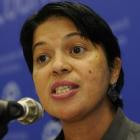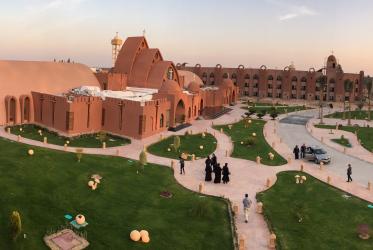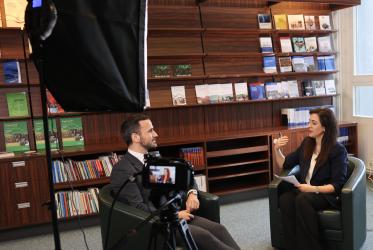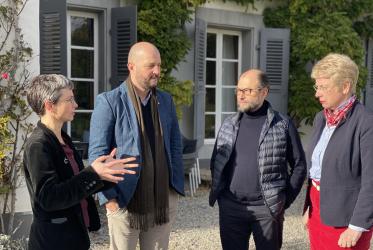To be part of the WCC Commission on Faith and Order is a privilege and at the same time a big challenge. Its aim has been that Christians may make theology together through dialogue and communion in search for the visible unity of the Church.
Ecclesiology (the theological affirmation of being a Church), moral discernment and the sense of authority have been exhaustingly and deeply studied themes of the commission during the last years. In the 10th Assembly of the WCC (Busan, 2013), the commission was reconstituted and is now comprised of 49 members, representing 33 churches among the member churches of the WCC, the Roman Catholic Church and other Christian denominations in dialogue.
The first meeting after the Busan Assembly is being hosted by the Orthodox Church in Romania, at the Caraiman Monastery in Busteni. Since 18 June, commissioners are gathered, accompanied by consultants of partner organizations from around the world.
Until the last day of the meeting, 23 June, participants will be discerning themes to be developed in the work of the commission to follow up those studied in the previous period but also considering new and challenging issues related to the visible unity of the Church.
One important decision already taken is that the themes chosen for study in this period will be part of the process of the Pilgrimage of Justice and Peace. The Faith and Order Commission intends to offer theological input to the Pilgrimage of Justice and Peace from the perspective of ecclesiology, moral discernment and source of authority. The themes for study will be: 1) The Church on a Pilgrimage of Justice and Peace in today’s world; 2) Pilgrimage toward a common vision of the Church; 3) Moral discernment in the Church.
The pilgrimage is understood as a contribution to the spiritual journey on justice and peace through what is unique in the commission’s own journey.
Therefore, connecting my engagement on the international reference group on Pilgrimage of Justice and Peace with being a member of the WCC Commission on Faith and Order,makes my ecumenical commitment denser and has expanded its scope.
It brings me joy and hope to participate in a process that shall seek to overcome the polarization between theology and Christian action, between "faith and order" and "life and work" (another historical movement that gave life to the WCC, focused on serving and promoting fullness of life).
To put the Pilgrimage of Justice and Peace at the centre of work in the Faith and Order Commission is to affirm its significance for ecumenical theology. It means to unite faith and life; to unite the sense of being church and the love for the world; to unite theology and action – elements often separated by binary conceptions of reflection and action.
Thus, the Pilgrimage of Justice and Peace can be recognized to be more than a political agenda, as a biblical and theological concept. To speak and work towards the visible unity of the Church today is, ever more, to speak and work on how unity reflects, or should reflect, justice and peace.





